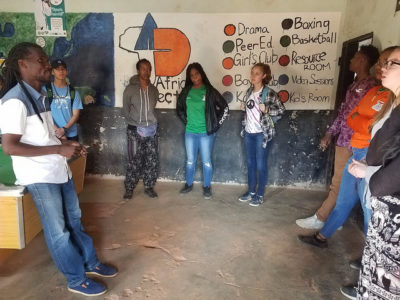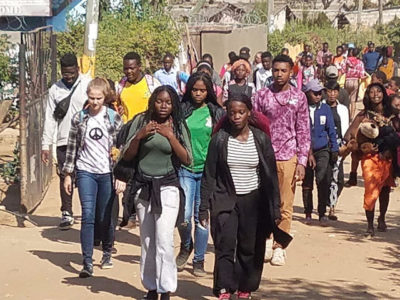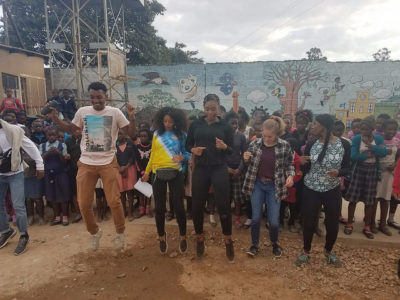 Wednesday, July 4 – It’s always exciting learning about a new culture. Today, we spent time at Africa Directions, a youth-led, non-governmental organization, that teaches youth, both male and female, about sex education and how to protect themselves from various STDs and infections, as well as how to develop healthy relationships. It was established in 2000 and is currently located in a socially and economically deprived compound that is not supported by the government.
Wednesday, July 4 – It’s always exciting learning about a new culture. Today, we spent time at Africa Directions, a youth-led, non-governmental organization, that teaches youth, both male and female, about sex education and how to protect themselves from various STDs and infections, as well as how to develop healthy relationships. It was established in 2000 and is currently located in a socially and economically deprived compound that is not supported by the government.
Africa Directions’ services are free and available for any young person within the community. It is open for youth to come and talk to adults and friends about protection and sex. It also serves as a place to spend time with friends and is an alternative for socializing in places that distribute alcohol like local bars of which there are many. They also provide youth with other activities like drumming and drama. From the teens at Africa Directions, we learned that many young people in Zambia are not taught how to protect themselves when having sex, and many do not have a trusted adult to talk to about sex.
 When we arrived, we spent some time on introductions including a game of clapping, singing and dancing. We then spent time interacting and talking with Africa Directions’ peer educators, the ones who actually lead the workshops for the youth and in the community. They asked us questions like, “Are condoms accessible in schools and communities?” or “What age in America can females get an abortion?” The answers that we gave them left them with even more questions, and their faces in awe because they could not believe how early teenagers in DC had reproductive rights when it comes to their own health. They also explained to us that when young girls get pregnant in Zambia, they can no longer go to school while they are pregnant. However, sadly, most girls do not continue to go to school even after they give birth because they either are worried about being judged or they have to get a job to support their child. We also discussed how some young boys have to drop out of school to support the baby and the girl because it has now become his responsibility to help and not the parents of either the girl or the boy. However, it is not hard to believe that a lot of them will not admit they are the father. Hearing this opened my eyes to how lucky some youth are in America, and how sometimes we take what we have or have been given for granted, and we don’t realize it.
When we arrived, we spent some time on introductions including a game of clapping, singing and dancing. We then spent time interacting and talking with Africa Directions’ peer educators, the ones who actually lead the workshops for the youth and in the community. They asked us questions like, “Are condoms accessible in schools and communities?” or “What age in America can females get an abortion?” The answers that we gave them left them with even more questions, and their faces in awe because they could not believe how early teenagers in DC had reproductive rights when it comes to their own health. They also explained to us that when young girls get pregnant in Zambia, they can no longer go to school while they are pregnant. However, sadly, most girls do not continue to go to school even after they give birth because they either are worried about being judged or they have to get a job to support their child. We also discussed how some young boys have to drop out of school to support the baby and the girl because it has now become his responsibility to help and not the parents of either the girl or the boy. However, it is not hard to believe that a lot of them will not admit they are the father. Hearing this opened my eyes to how lucky some youth are in America, and how sometimes we take what we have or have been given for granted, and we don’t realize it.
 We also discussed the difference between healthy and unhealthy relationships. In many ways Americans’ views on relationships are similar to Zambians’ and in many ways they aren’t. In both Zambia and America, teen relationships are somewhat focused on sex and what role the boy and the girl play within the relationship. The difference is that in Zambian relationships, it seemed like the men are more dominate and I thought they had some trouble defining the difference between healthy and unhealthy. In America, this can also be a problem but I think not as much because eventually there will be someone who will try to convince you that the relationship is not good for you. Thinking about this in my head, I thought about how much help and how many resources we have in America to help people who are in unhealthy relationships. However, I also feel like there is still a need for more resources to help both women and men who are in abusive relationships.
We also discussed the difference between healthy and unhealthy relationships. In many ways Americans’ views on relationships are similar to Zambians’ and in many ways they aren’t. In both Zambia and America, teen relationships are somewhat focused on sex and what role the boy and the girl play within the relationship. The difference is that in Zambian relationships, it seemed like the men are more dominate and I thought they had some trouble defining the difference between healthy and unhealthy. In America, this can also be a problem but I think not as much because eventually there will be someone who will try to convince you that the relationship is not good for you. Thinking about this in my head, I thought about how much help and how many resources we have in America to help people who are in unhealthy relationships. However, I also feel like there is still a need for more resources to help both women and men who are in abusive relationships.
 At the end of the class, we went out into the community to watch a drumming and drama presentation in a lot in front of a clinic that provides services for the community. There were actually a couple of drunk men who kept coming into the circle to dance with everyone. Interestingly enough, they were not chased away at first and, often, made their way out on their own. Afterwards, when we debriefed the whole event, the peer educators explained that the drunk men are still part of the community and cannot be excluded and that they often protect and guard the performance rather than being problematic. We ended the day with some more dancing with the peer educators as we showed them the Wobble and they showed us some more traditional Zambian dancing which was fun. Dancing has certainly been a way that we’ve learned to connect with many of the youth here in Zambia.
At the end of the class, we went out into the community to watch a drumming and drama presentation in a lot in front of a clinic that provides services for the community. There were actually a couple of drunk men who kept coming into the circle to dance with everyone. Interestingly enough, they were not chased away at first and, often, made their way out on their own. Afterwards, when we debriefed the whole event, the peer educators explained that the drunk men are still part of the community and cannot be excluded and that they often protect and guard the performance rather than being problematic. We ended the day with some more dancing with the peer educators as we showed them the Wobble and they showed us some more traditional Zambian dancing which was fun. Dancing has certainly been a way that we’ve learned to connect with many of the youth here in Zambia.
Drew B., Washington Leadership Academy
